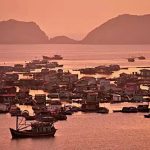OTA’s Invasion
Recently, Thomas Cook, the pioneer of global travel agencies, was sold by Fosun Tourism Culture (HK: 01992). According to the announcement, Renaissance Tourism Culture has sold 100% equity of its subsidiary Thomas Cook Tourism (UK) to Polish online travel agency ESKY PL.S.A., The selling price is as high as £ 30 million.
According to the disclosed data in the announcement, as of July 31, 2024, Thomas Cook’s net assets were -32.8027 million pounds. In 2022 and 2023, its after tax net losses were as high as 15.0497 million pounds and 4.1766 million pounds, respectively. As of September 5th, Thomas Cook still owes £ 47.4983 million in unpaid shareholder loans to Fosun Tourism Culture.
The predicament faced by the world’s first travel agency, founded in the 19th century, is a microcosm of the global travel agency industry. In the first half of 2024, travel agency listed companies in the A-share market were also struggling. For example, the travel agency business revenue of Zhongxin Tourism (SZ: 002707), ST Caesar (SZ: 000796), and Lingnan Holdings (SZ: 000524) has only recovered to 45.58%, 6.02%, and 42.93% of the same period in 2019. Although most of them attribute it to the fact that the outbound tourism market is still in the recovery period, before 2019, even though the cultural and tourism market continued to grow year by year, their operating performance could only be described as stable.
Bank of China Securities bluntly pointed out in its research report that the decline of travel agencies stems from their inability to adapt to the development of science and technology, and their inability to combine relevant technological innovations with traditional business reforms. In particular, the vigorous development of Internet concepts and technologies has given birth to OTA. This online travel agency based on the Internet does not need to bear too much store fees and employee salaries, and can integrate and present the originally fragmented travel booking information, which greatly improves the convenience of independent travel for tourists, and also increases the transparency of information and the cost performance of tourism products.
At the same time, with the intergenerational changes in the tourism population, young people have begun to pay attention to personalized tourism experiences and integrate tourism with interests and value orientations, promoting the diversification and stratification of tourism demand. The popularity of new media platforms such as Tiktok and Xiaohongshu has gradually made the changes in tourism demand penetrate into the middle-aged and even the elderly. Therefore, the current market demand has shown a comprehensive and differentiated trend, which has undergone earth shaking changes compared to the 20th century when tourism was the main focus.
Due to the ability of OTA to quickly integrate various tourism resources, providing diverse tourism products including independent travel, customized tours, small group tours, as well as booking transportation, accommodation, tickets, etc., it allows tourists to freely match personalized tourism experiences and is more favored by the market. Moreover, the oligopolistic competitive situation allows OTAs to invest more in research and development expenses, continuously optimize user experience, and innovate products, driving demand through innovation and accelerating the segmentation of the cultural and tourism market.
From a business perspective, OTA is actually a substitute for travel agencies, which greatly improves the efficiency of tourists’ consumption decisions and travel experience, and divides the travel agency market into two parts. Zhongchengxin International stated in its research report that top OTA companies are constantly squeezing the survival space of offline travel agencies.
The confusion of travel agencies
Looking back on the past, the birth of travel agencies is closely related to the characteristics of the industry and the background of the times. On the one hand, tourism activities include six elements: food, accommodation, transportation, travel, shopping, and entertainment. For individuals, independently planning a trip is too complex and time-consuming. On the other hand, before the 21st century, due to the fact that the Internet, especially mobile Internet, has not yet been popularized, the efficiency of information dissemination is low, and there is a huge “information gap” in the tourism market, it is difficult to carry out reasonable travel planning.
Travel agencies simplify the process of organizing tourism by providing one-stop travel services for tourists. At the same time, with the help of bulk procurement of tourism elements, they can also offer lower prices to tourists, which provides great convenience for tourists and promotes the vigorous development of the tourism industry.
However, with the advent of the mobile Internet era, the “information gap” that travel agencies rely on for survival has been gradually erased. At the same time, personalized and finely differentiated market demand has not only been “robbed” by OTAs of some market shares, but also has led to the transformation of the past travel agencies’ basic plates – large group travel model and all inclusive products to small group travel model, half inclusive and even small package products.
Compared to small group tours and half package prices, large group tours and full package prices have lower costs and higher revenue for travel agencies, “said a travel agency practitioner helplessly. The development and growth of OTA, as well as the continuous breakthroughs of emerging technologies such as AI in the future, have led to a continuous loss of customers for travel agencies. Even for outbound travel, more and more tourists are turning to OTA. Maidian noticed that according to Ctrip’s 2024 semi annual report, the total revenue of its international OTA platform increased by about 70% year-on-year.

This travel agency practitioner also mentioned that due to the low entry threshold, the competition in the travel agency market was very fierce before the rise of OTA. In this low profit state, practitioners are more concerned about how to survive, and have no time to pay attention to product innovation and tourist experience. The appearance of many negative news actually reflects the helplessness of travel agencies, because tour guides also have to eat, and the industry’s state is more like being trapped in a “death spiral”.
It is worth noting that according to the “Review and Prospect of the Development History of China’s Travel Agency Industry” published in the China Tourism News, as early as 2009, the average profit margin of travel agencies had dropped from 10.04% in 1990 to 0.64%. According to data disclosed by the Ministry of Culture and Tourism, as of the end of June 2024, the number of travel agencies in China has reached 60800. According to the “2024 Q1 National Travel Agency Statistical Survey Report”, the average number of tourists organized by each travel agency in the first quarter of 2024 decreased by 15.68% compared to the same period in 2023, and a significant decrease of 57.69% compared to the same period in 2019.
The value of the hotel
So, have travel agencies already lost their momentum? Recently, Japan’s high-end travel agency Reiwa Travel received approximately $34 million in financing, and since its establishment, it has accumulated approximately $49 million in financing. Of course, the future development of Reiwa Travel is still full of unknowns, but its value proposition has caught the attention of Maidian.
According to media reports, Reiwa Travel is positioned to provide users with unique experiences, such as enjoying dinner at popular restaurants that are difficult to book, staying at world-class luxury hotels, and providing the most efficient route recommendations, in order to achieve customized travel concierge services. What are the core selling points of Reiwa Travel products? Located in popular restaurants, top luxury hotels, and efficient air routes.
Returning to the current Chinese cultural and tourism market, who is most likely to become the core selling point among the six elements of “food, accommodation, transportation, tourism, shopping, and entertainment”? Maidian thinks it’s a hotel. As is well known, with the rise of leisure vacation tourism, hotels are no longer simply meeting the living needs of tourists, but rather multifunctional tourism complexes that integrate living, socializing, and entertainment. Therefore, leisure vacation hotels have emerged, giving birth to brands such as Huajiantang, Hantian, Junlan, Kaiyuan Fangcaodi Village, and Leidesen Manor.
These leisure resorts are either located in the bustling downtown areas of the city or in scenic areas with pleasant scenery, and they are unique. For example, the Shaoxing Lanting Anlu Hotel, located at the foot of Kuaiji Mountain, is “hidden” among the towering mountains, with lush forests and bamboo groves, as well as clear flowing rapids. It is mainly designed in the style of Ming and Qing Huizhou architecture and is equipped with leisure and entertainment facilities. For example, Kaiyuan Forest Park integrates multiple formats such as vacation hotels, characteristic wooden houses, indoor and outdoor water parks, children’s parks, natural amusement parks, education, and exhibitions

Due to the inherent destination attributes of many leisure and vacation hotels, which are often located in bustling urban areas or tourist destinations, if travel agencies can take this as the core of their products and integrate multiple formats such as surrounding scenic spots, catering, and shopping, their products will also have greater appeal and even form differentiated competitiveness, while also catering to market demand.
Speaking of which, many people may hold opposing views. On the one hand, many domestic tourists no longer follow group tours; On the other hand, the premium level of resort hotels is relatively high, while the budget of mainstream tour groups is low and difficult to meet, so the overall source market of resort hotels has fewer tour group customers.
However, in remote areas such as Xinjiang, Xizang, and Gansu, many countrymen still choose to follow the group. Why? Due to inconvenient transportation and sparse population in those areas, travel agencies often adopt small group models to meet tourists’ needs for convenience, efficiency, and safety. At present, the customer base of leisure vacation hotels is mainly composed of self driving tourists with middle to high income levels. However, for those tourists with low to medium income levels and no self driving tools, don’t they aspire to it?
In fact, whether it’s OTA or travel agency, as long as value is created, tourists will pay. When travel agencies were first born, they created enormous value for tourists. To this day, if travel agencies want to break through, they still need to return to their original intention of creating value, and provide tourists with cost-effective and attractive tourism products through large-scale procurement and professional services.
Collaborating with leisure vacation hotels can provide tourists with cost-effective products through large-scale procurement and professional services, while also leveraging the unique experience of leisure vacation hotels to make the products more attractive. Moreover, the operating performance of leisure vacation hotels is greatly affected by seasonal factors. If travel agencies can contribute more group guests during the off-season, they are also willing to cooperate and negotiate prices. Moreover, the large membership scale of top liquor management companies is also a good marketing channel for travel agencies.



